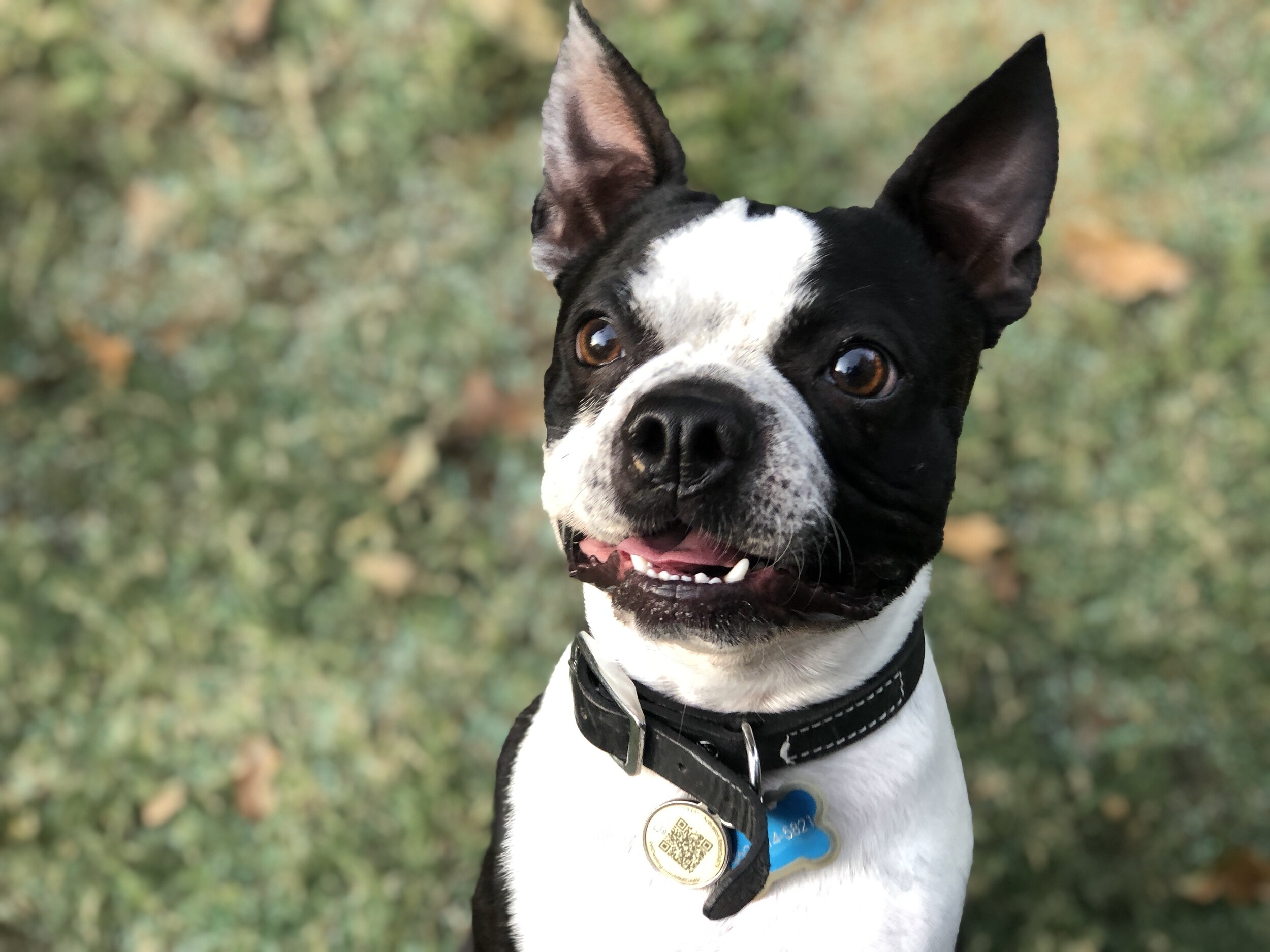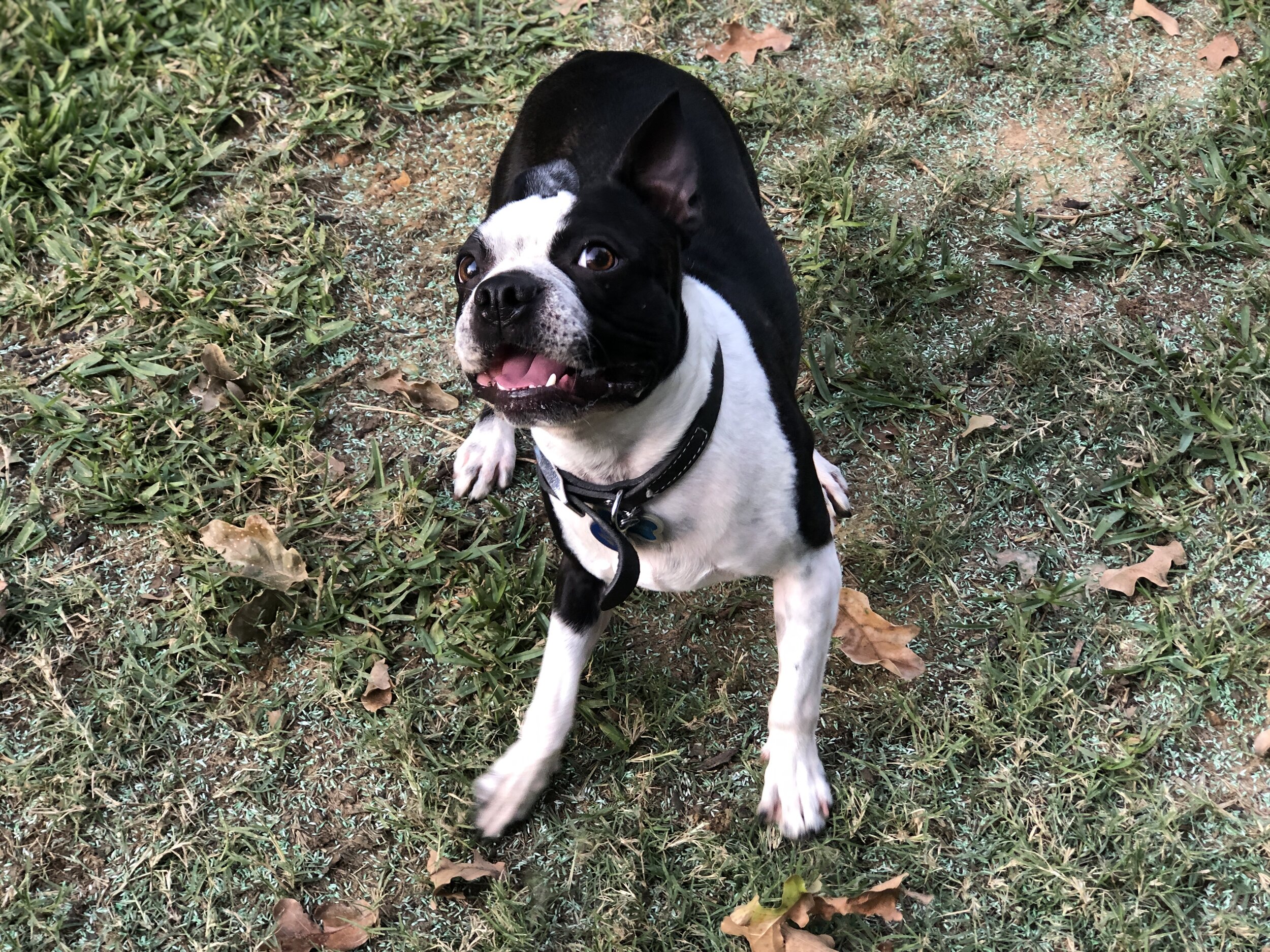Your little Boston Terrier brings you great joy, that is, until they curl up to go to sleep. Then, you can’t believe the noises that come out of them! It sounds like grunting sometimes and snoring other times. Do Boston Terriers snore? Why are they so loud about it?
Boston Terriers are indeed known for their loud snoring. The reason they snore so audibly is because of their shorter face. Their abridged muzzle can interrupt breathing, which then leads to snoring, grunting, wheezing, and other noises.
What exactly do wheezing and grunting sound like? Should you be concerned that your Boston Terrier snores so loudly? Keep reading, as we’ll answer those questions and more in this article. You won’t want to miss it.
Why Do Boston Terriers Snore?
You may not have thought about snore volume as a factor when adopting a dog, but now you wish you had. If anything, you would have assumed that because the Boston Terrier is a smaller dog that their snores would be equally tiny. Instead, they’re anything but. What causes the Boston Terrier to snore so noisily?
It’s their face shape. The same refined features that made you fall in love with your Boston Terrier are what’s causing them to snore so loud. With a shorter muzzle, the Terrier can’t breathe as clearly as other breeds with a longer muzzle. Thus, when they slip off to dreamland, it’s only a matter of time before you’ll hear those loud, characteristic snores.
Terriers aren’t the only small dog to snore like a dickens. If you own or are thinking of adopting a French Bulldog (or Frenchie), a Shih-Tzu, a Bulldog, or a Pug, you can expect snoring that rivals the Boston Terrier’s. These dogs are all brachycephalic, which just refers to their snout size.
By the way, if you’re wondering why your Terrier is always so gassy, that has to do with the shape of their face as well. Without quite as much muzzle as other breeds, when your Boston Terrier chows down, they end up swallowing a lot of air with their food. The air is then released out of their rear end. Fun stuff!
What Other Sort of Noises Do Boston Terriers Make?
Snoring isn’t all you’ll hear from your Boston Terrier. Sure, there’s the trademark whining and barking of all dogs, but the Terrier has an assortment of other unique noises they’ll emit as well. These are also due to their smaller muzzle.
Grunting
The grunt is a guttural sound that’s lower in volume than a snore. We people can grunt, and so can our Boston Terriers. Although it may sound like a noise of discomfort, it often isn’t. Instead, your Terrier may grunt to tell you they’re happy.
That said, if you hear a lot of frequent grunting, you might want to give your pup the once-over or consider a vet appointment. They could be sick, injured, or uncomfortable.
Wheezing
Unlike grunting, which is a nice noise in disguise, wheezing is not. Any dog can wheeze, but it’s more common in smaller-snouted breeds like your Boston Terrier. An obstruction in the dog’s airway causes them to make a sound that’s almost like whistling. This is wheezing. Airway obstructions can occur in the large bronchi or trachea.
If your Terrier wheezes for seconds at a time, then it’s not considered a medical emergency. Prolonged wheezing does necessitate immediate attention from a vet, though.
Snuffling
Another noise from your Boston Terrier to keep an ear out for is snuffling. This almost sounds like your dog is sniffing at something, but heavily and intensely. If your Terrier begins sneezing after snuffling, then it could be due to irritants in the air. These can include pollen, carpet powders, perfumes, and dust.
The best course of action is to move your Terrier to an environment where the air is a bit cleaner and clearer. If the snuffling and sneezing persists, get in touch with your vet right away.
Snorting
A little snort here and there from your Boston Terrier is nothing to worry about. You should be aware of the pharyngeal gag reflex, which is also referred to as reverse sneezing. This can lead to snorting as well, but often very forcefully. Your dog begins inhaling and exhaling as fast as they can, almost like they’re breathing in a sneeze instead of letting it out.
Reverse sneezing is a situation that again warrants a vet’s immediate attention. Not all snorting is a reverse sneeze, though, so use your discretion.
Is Loud Snoring Normal for Boston Terriers?
Given that some of the other noises your Boston Terrier makes could be indicative of a health issue, that has you worried about just how loudly they snore. Should you contact your vet to get your dog looked over?
While regular checkups are always a good thing, there’s often no need to take an extra trip to the vet just because your Terrier snores. Again, it’s all due to the breathing obstructions caused by their face shape.
There are some instances in which snoring could be a symptom of a larger, underlying problem. If the snoring has suddenly gotten stronger or louder, it could be due to an obstruction in the nose (besides the Boston Terrier’s natural obstructions), an infection, a reaction to a medication, or allergies.
If your vet rules out the above, then you know your Terrier is healthy, even if they continue snoring.
Can You Reduce the Snore Volume of Your Boston Terrier? How?
Okay, so there’s nothing wrong with your Boston Terrier for snoring loudly, but man, it sure is driving you crazy! You wish your dog had a volume switch that you could turn all the way down. A mute button would also be nice.
In reality, your pup has neither. Does this mean you’re forced to listen to their especially noisy snoring every time they take a nap? After all, sometimes their snoring impacts your own ability to sleep, and other family members have had similar complaints as well. Is there anything you can do to quieten your dog down a bit?
As a matter fact, there is. These lifestyle changes aren’t guaranteed to reduce snoring, but they’re worth a shot.
Don’t Exercise Your Terrier in Hot Weather
Have you ever stepped outside for a jog on a humid day? It feels like you’re moving through soup. Within minutes, you’re drenched in sweat and can barely breathe.
The same can be true of your Boston Terrier. They already don’t breathe perfectly in the first place due to their breed. Any situation that would worsen breathing should be avoided, as it will only lead to more snoring later.
Maintain Indoor Air Quality
Your Boston Terrier doesn’t need to have allergies to react to irritants in the air by snuffling, sneezing, and snoring. The best way to keep the air in your home clean is to invest in a HEPA filter and a humidifier. Vacuum often, don’t light candles, and keep air fresheners out as well.
Wash Your Dog’s Bed Frequently
Where does your Terrier sleep the most often? If it’s in their own bed, then you want to toss the bed into the washer at least weekly. If it’s your bed, then make sure you’re changing your sheets just as regularly. This will keep allergens and other potential irritants from settling on the bedding and deepening your Boston Terrier’s snoring.
Teach Your Dog to Sleep in a More Optimal Position
There are certain positions your Boston Terrier can sleep in that may reduce snoring volume. One of these is curling up on their side. Their airways are the most open, which means quieter snoring and perhaps even less of it. It may take some time to train them to sleep this way, but it’s worth it. A round-shaped bed may help.
Have Them Use a Pillow
Another way to open up those airways? Try a doggy pillow! Your Terrier will feel like they’re sleeping in the lap of luxury while you’ll enjoy a quieter household day and night.
Conclusion
Boston Terriers have a smaller snout that’s conducive to loud snoring. This can be jarring if you’re trying to get a good night’s sleep, but there are ways to reduce the noise. By switching beds, adding a pillow, and keeping the home clean, your Terrier may snore less.
While snoring is often not a health issue, it can be at times. It’s always a good idea to see a vet if your Boston Terrier is snoring very loudly. Good luck!
Author Nicole Malczan











